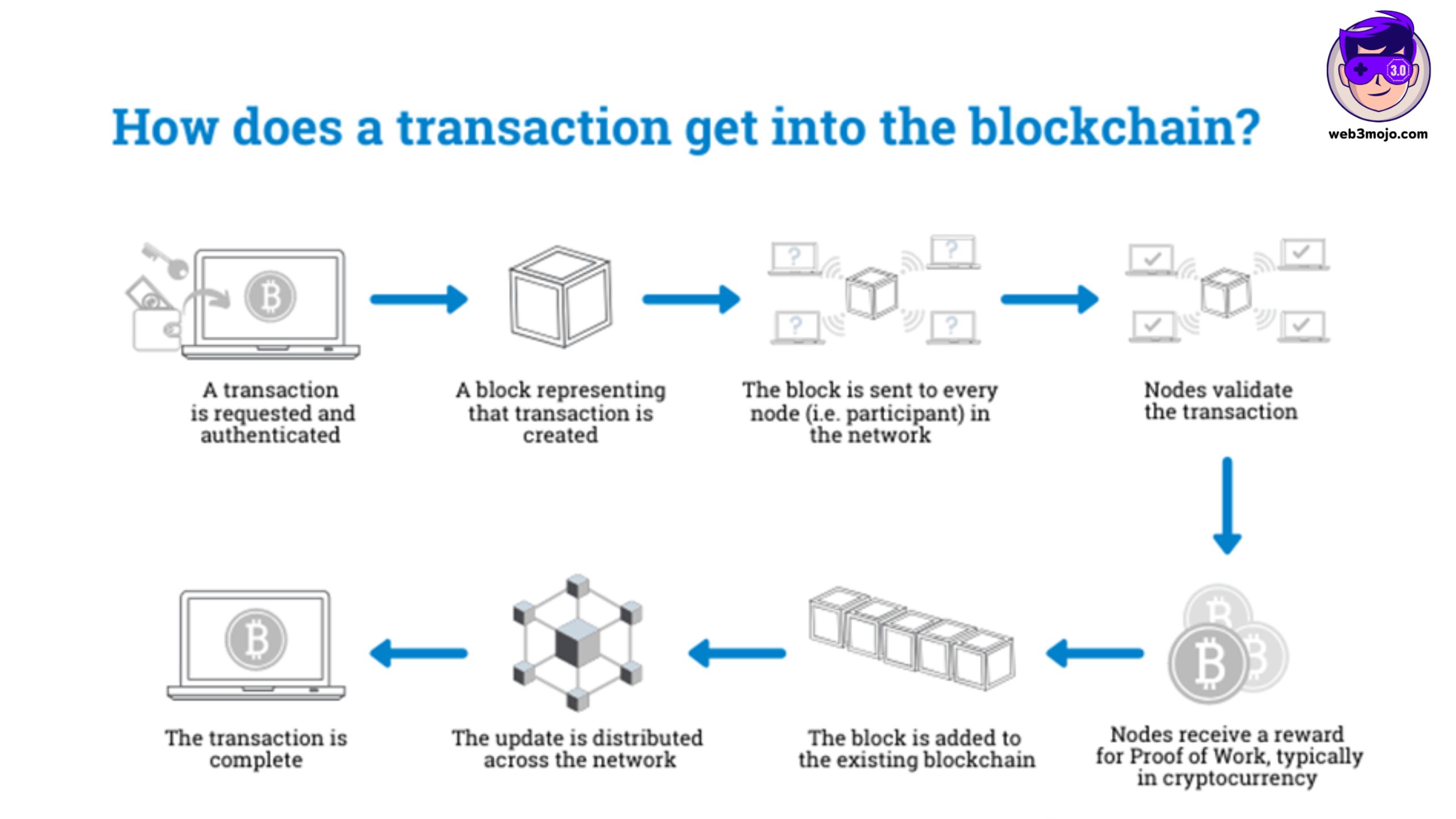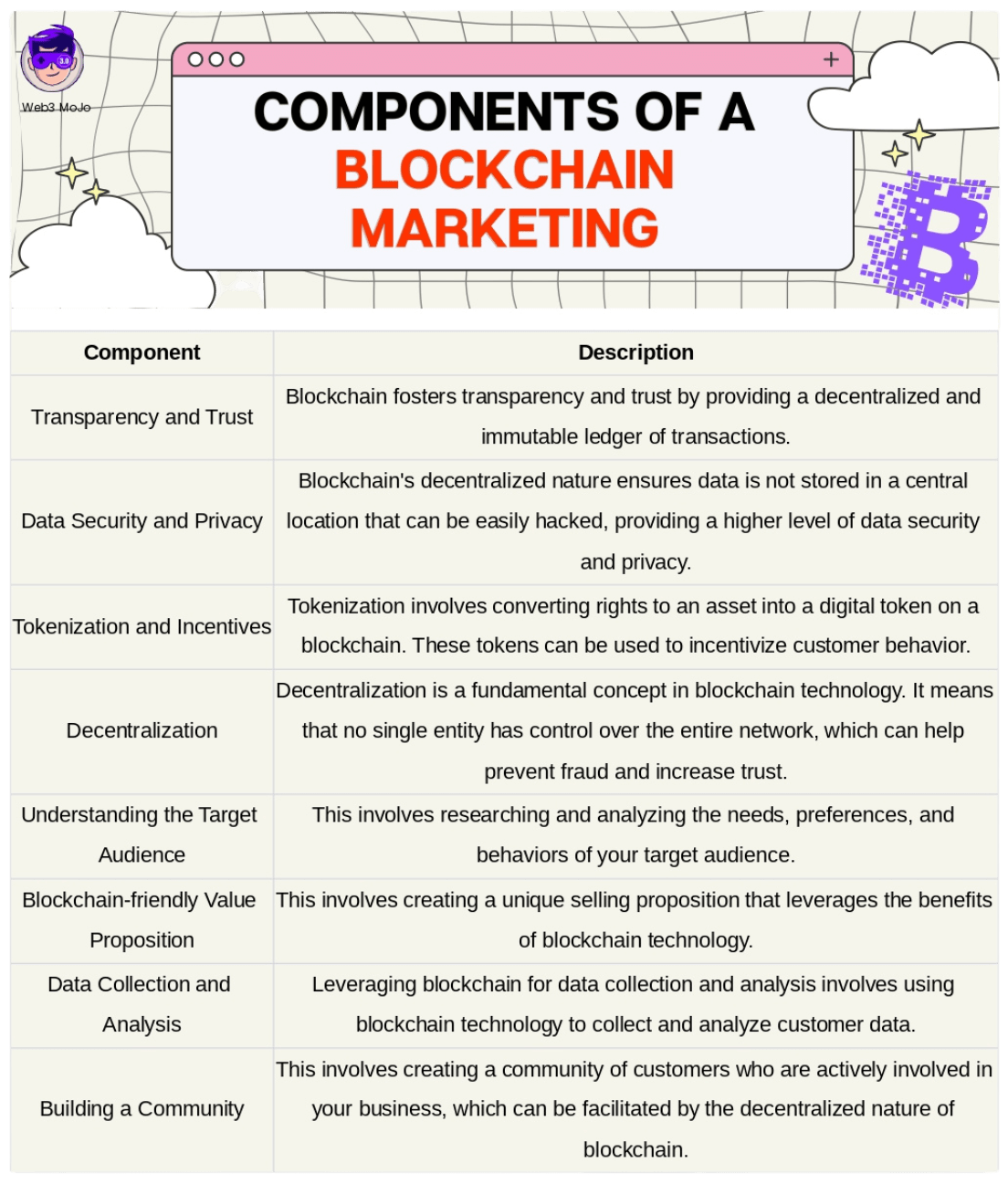I. Introduction
Blockchain technology, at its core, is a decentralized and distributed digital ledger that records transactions across multiple computers. It ensures that the recorded transactions are permanent, transparent, and cannot be altered, thus providing a high level of security. This technology was first outlined in 2008 and implemented as a core component of the cryptocurrency Bitcoin.
The intersection of blockchain and marketing
The intersection of blockchain and marketing is a relatively new and evolving field. Blockchain technology can be used to create a more transparent, secure, and fair marketplace for businesses and consumers alike. It has the potential to revolutionize various aspects of marketing, including data collection, customer loyalty programs, and digital advertising. For instance, blockchain can be used to track the customer journey, ensuring that the data collected is accurate and trustworthy.
Importance of a blockchain marketing strategy
Web3 Marketing is taking over the world. In today’s digital age, a blockchain marketing strategy is becoming increasingly important. It allows businesses to leverage the benefits of blockchain technology to enhance their marketing efforts. A well-planned blockchain marketing strategy can help businesses build trust with their customers, improve data security, and create more effective marketing campaigns.

II. Understanding Blockchain Marketing
A. Definition of blockchain marketing
Blockchain marketing refers to the use of blockchain technology in marketing practices. It involves leveraging the transparency, security, and decentralization aspects of blockchain to improve various areas of marketing, such as data collection, customer loyalty programs, and digital advertising.
B. How blockchain technology is disrupting traditional marketing
Blockchain technology is disrupting traditional marketing in several ways. First, it provides a high level of transparency, which can help build trust with customers. For example, businesses can use blockchain to verify the authenticity of their products, which can be particularly useful for industries such as luxury goods or organic food.
Second, blockchain can improve data security. Traditional marketing often involves collecting large amounts of customer data, which can be vulnerable to breaches. Blockchain can help secure this data and protect customer privacy.
Third, blockchain can make digital advertising more efficient. For instance, it can be used to prevent ad fraud, which is a major issue in the digital advertising industry. Blockchain can also enable more accurate tracking of ad performance.
C. Benefits of blockchain marketing
There are several benefits of blockchain marketing. These include:
- Enhanced Transparency: Blockchain’s decentralized nature ensures all transactions are recorded and visible to all parties involved, enhancing trust and transparency.
- Improved Data Security: Blockchain’s immutable and encrypted nature makes it nearly impossible for data to be altered or hacked, providing a higher level of data security.
- Increased Efficiency: Blockchain can automate various marketing processes, reducing the need for intermediaries and increasing efficiency.
- Better Customer Engagement: By providing a more secure and transparent system, blockchain can help businesses build better relationships with their customers, leading to increased engagement and loyalty.
- Cost Savings: By eliminating the need for intermediaries and reducing fraud, blockchain can lead to significant cost savings in marketing.
III. Key Components of a Blockchain Marketing Strategy
A. Transparency and Trust
- Blockchain fosters transparency and trust by providing a decentralized and immutable ledger of transactions. This means that all transactions are recorded and visible to all parties involved, which can help build trust with customers. For example, a business can use blockchain to verify the authenticity of its products, which can be particularly beneficial in industries such as luxury goods or organic food.
- Case Study: De Beers, the diamond company, has implemented blockchain technology to track the journey of diamonds from the mine to the customer. This ensures that the diamonds are ethically sourced and authentic, which builds trust with customers.
B. Data Security and Privacy
- Blockchain plays a crucial role in data security. Its decentralized nature means that data is not stored in a central location that can be easily hacked. Instead, it is stored across a network of computers, making it nearly impossible for data to be altered or hacked.
- Privacy is a critical aspect of marketing, and blockchain can help protect customer privacy. For example, blockchain can be used to create a secure, decentralized identity for each customer. This identity can be used to track customer behavior without revealing sensitive personal information.
C. Tokenization and Incentives
- Tokenization involves converting rights to an asset into a digital token on a blockchain. In the context of marketing, businesses can create digital tokens that represent loyalty points or rewards.
- These tokens can be used to incentivize customer behavior. For example, a business could reward customers with tokens for making purchases or writing reviews. These tokens could then be redeemed for products or services.
D. Decentralization
- Decentralization is a fundamental concept in blockchain technology. It means that no single entity has control over the entire network. Instead, control is distributed among all participants in the network.
- Decentralized marketing can have several benefits. For example, it can help prevent fraud and increase trust with customers. It can also enable peer-to-peer transactions, which can reduce costs and increase efficiency.

IV. Implementing a Blockchain Marketing Strategy
A. Understanding the target audience and market is the first step in implementing a blockchain marketing strategy. This involves researching and analyzing the needs, preferences, and behaviors of your target audience.
B. Developing a blockchain-friendly value proposition involves creating a unique selling proposition that leverages the benefits of blockchain technology. This could involve highlighting the transparency, security, or efficiency of your products or services.
C. Leveraging blockchain for data collection and analysis involves using blockchain technology to collect and analyze customer data. This data can be used to gain insights into customer behavior and to personalize marketing efforts.
D. Creating a tokenization strategy involves deciding how to use digital tokens in your marketing efforts. This could involve creating a loyalty program that rewards customers with tokens, or using tokens to incentivize certain behaviors.
E. Building a community through decentralization involves creating a community of customers who are actively involved in your business. This could involve allowing customers to vote on business decisions using tokens, or creating a platform where customers can interact with each other.
V. Challenges in Blockchain Marketing
A. Technological challenges: Blockchain is a relatively new technology, and many businesses may lack the technical expertise to implement it effectively. Additionally, the technology itself is still evolving, and there may be technical challenges related to scalability and interoperability with existing systems.
B. Regulatory and legal challenges: The regulatory environment for blockchain is still uncertain in many jurisdictions. This can make it difficult for businesses to implement blockchain solutions without the risk of non-compliance with existing or future regulations.
C. Market adoption and understanding: Despite the growing interest in blockchain, many consumers and businesses still do not fully understand the technology. This can make it difficult to gain market acceptance for blockchain-based solutions.
VI. Case Studies of Successful Blockchain Marketing Strategies
A. Case Study 1: VeChain, a blockchain platform, has successfully used blockchain technology to enhance supply chain management. They have partnered with several companies to track products from production to delivery, ensuring authenticity and building consumer trust.
B. Case Study 2: Basic Attention Token (BAT) has revolutionized digital advertising by using blockchain technology. BAT tokenizes user attention and rewards users for interacting with ads, creating a more equitable digital advertising ecosystem.
C. Case Study 3: IBM has used blockchain technology to create a more transparent and efficient food supply chain. Their Food Trust platform uses blockchain to track food products from farm to store, improving food safety and reducing waste.
These case studies demonstrate the potential of blockchain marketing strategies to improve transparency, enhance customer engagement, and create more efficient business processes.
VII. Future of Blockchain in Marketing
A. Predicted trends: As blockchain technology continues to evolve, we can expect to see several trends in blockchain marketing:
- Increased Adoption: As more businesses understand the benefits of blockchain, we can expect to see increased adoption of blockchain marketing strategies.
- Integration with AI: Blockchain could be integrated with artificial intelligence (AI) to create more personalized and efficient marketing strategies.
- Enhanced Customer Loyalty Programs: Blockchain could be used to create more transparent and engaging customer loyalty programs.
- Decentralized Social Media Platforms: Blockchain could be used to create decentralized social media platforms that reward users for creating and sharing content.
B. Role of blockchain in the future of digital marketing:
Blockchain has the potential to play a significant role in the future of digital marketing. It can provide a solution to many of the challenges facing digital marketing today, including data security, transparency, and customer engagement. By leveraging blockchain, businesses can create more effective and customer-centric marketing strategies.
VIII. Conclusion
A blockchain marketing strategy can provide numerous benefits, including enhanced transparency, improved data security, and increased customer engagement. It can help businesses build trust with their customers, create more effective marketing campaigns, and stay ahead in the digital age.
As we move towards a more digital and interconnected world, it is crucial for businesses to stay ahead of the curve. Implementing a blockchain marketing strategy can provide a competitive edge and help businesses thrive in the digital age. Therefore, businesses should consider exploring blockchain technology and how it can enhance their marketing efforts.
In conclusion, blockchain technology holds significant potential for transforming marketing strategies. By understanding and leveraging this technology, businesses can create more transparent, secure, and customer-centric marketing strategies. It’s time to embrace the future of marketing with blockchain technology.
FAQs
The most effective crypto marketing strategy involves a combination of transparency, community engagement, and targeted communication. Building trust with potential investors and users is crucial in the crypto space. Content marketing, social media engagement, influencer partnerships, and participation in industry events can all be effective in promoting a crypto project.
Blockchain can be applied in marketing in various ways. It can be used to create transparent and tamper-proof customer databases, facilitate secure and instant payments, enable loyalty programs through tokenization, and verify the authenticity of products through supply chain tracking. Additionally, blockchain can enhance digital advertising by preventing ad fraud and ensuring accurate performance tracking.
In digital marketing, blockchain is used to improve data security and transparency. It can eliminate third-party intermediaries, reduce the risk of data breaches, and provide a more accurate view of customer behavior. Blockchain can also be used to create decentralized ad networks, where advertisers can directly engage with publishers and consumers, ensuring fair and transparent ad placements.
Blockchain impacts marketing and advertising by providing enhanced transparency, data security, and efficiency. It fosters trust between businesses and customers, reduces fraud, and enables more accurate tracking of marketing efforts. Decentralized marketing models powered by blockchain can eliminate unnecessary intermediaries, resulting in cost savings and improved customer engagement.
Blockchain marketing refers to the use of blockchain technology in marketing practices. It involves leveraging the transparency, security, and decentralization aspects of blockchain to improve various areas of marketing, such as data collection, customer loyalty programs, and digital advertising.
Blockchain technology can benefit marketing in several ways. It provides enhanced transparency and trust, ensuring data accuracy and fostering better relationships with customers. Blockchain also enhances data security, reducing the risk of data breaches and fraud. Moreover, tokenization on the blockchain enables innovative loyalty programs, incentivizing customer engagement. Additionally, blockchain-based digital advertising can lead to more efficient and fraud-resistant ad campaigns.

Blockchain Digital Marketing: Advantages, Challenges, and Future
25 July 2023[…] technology is poised to revolutionize the advertising landscape by addressing critical issues that have long plagued the marketing industry. Through its […]
Mastering Crypto Marketing: Engage, Thrive, Succeed! - Web3 MoJo
29 July 2023[…] Blockchain Marketing is the future. By building a strong foundation through audience understanding, setting clear objectives, and crafting a compelling brand story, and effectively leveraging digital platforms like social media and content marketing, blockchain projects can lay the groundwork for successful crypto marketing campaigns that resonate with their target audience and drive adoption. Additionally, incorporating influencer marketing can help extend the project’s reach and enhance its credibility within the crypto community. […]
A Guide to Social Media Success for Blockchain Projects - Web3 MoJo
19 November 2023[…] Blockchain Marketing: Unlocking the Future of Transparency […]